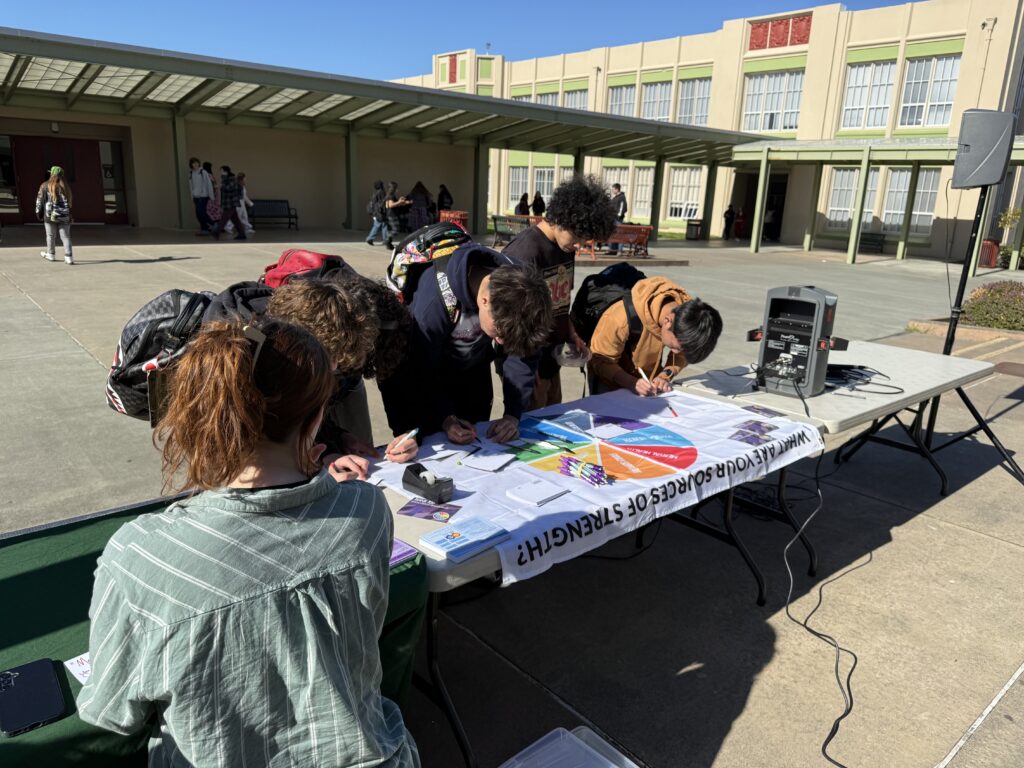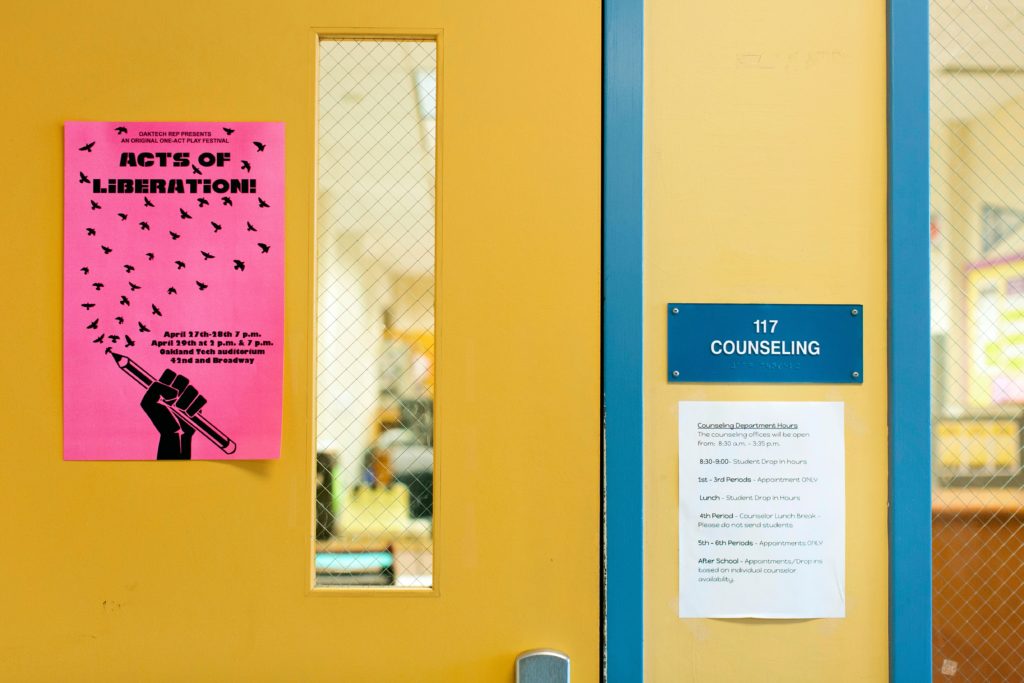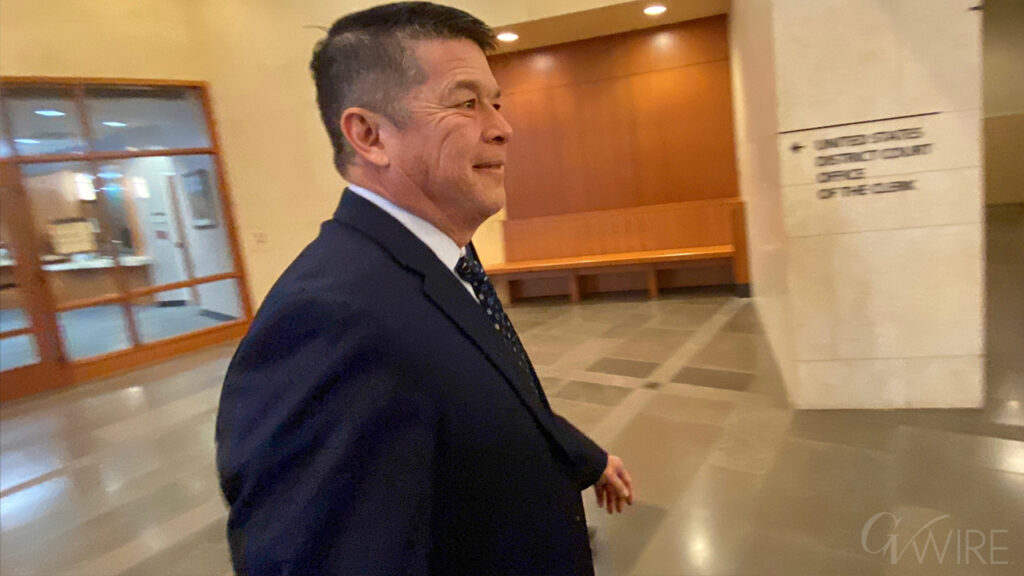School districts, county offices of education and universities will lose funds midway through five-year grants. (Alison Yin/EdSource)

- Trump administration will cancel $168M in school-based mental health grants funding hundreds of school social workers, counselors and wellness coaches in California.
- Rural, low-income districts have severe mental health provider shortages and higher rates of youth suicide than the rest of the state.
- Students could lose crucial services like mental health screenings, and crisis intervention, as well as yearslong relationships with trusted counselors.
Share
|
Getting your Trinity Audio player ready...
|
After Jane Huang graduated from Eureka High School in 2018, she knew she wanted to go to college in a different town.
She had struggled with severe depression, and when she could not keep up with her classes, teachers called her “lazy.” She dreaded going to school, where she felt isolated from friends and family and outcast as one of the few Chinese American students in Eureka, a rural and low-income seaport town in Northern California.

Vani Sanganeria
EdSource
As an undergraduate student at Cal State East Bay, majoring in psychology, Huang returned to Eureka High School as a student mental health worker in a role funded by the federal government’s school-based mental health grants in 2022.
“There was no wellness center when I went to school here, and knowing what the students go through, I just felt like I could really help them out,” said Huang, who is now a third-year wellness coach in the Eureka City Schools district.
Providers like Huang tackled what experts say is a student mental crisis, exacerbated by the Covid-19 pandemic, and most prevalent in poor, rural parts of the country. Now, as the Trump administration doubles down on a storm of “anti-DEI” cuts to education, these services could be terminated next, forcing Huang to leave students who still need help in Eureka.
On April 29, the U.S. Department of Education notified 49 grant recipients that it would cancel roughly $168 million that had been appropriated for mental health services to students in California, stating that recipients had violated their standard of “merit, fairness and excellence in education” and failed to comply with the “priorities and policy preferences” of the Trump administration.
Effective Dec. 31, school districts, county offices of education and universities will lose funds midway through five-year grants, a loss that will particularly devastate those in Eureka, Northern Humboldt and Del Norte in Northern California, which together will lose more than $12 million.
This story was originally published by EdSource. Sign up for their daily newsletter.
Eureka City Schools will lose about $3 million, which funds several mental health workers, including all of the district’s five school social workers, along with training and supervision for nine graduate student interns from Cal Poly Humboldt, said Sarahdee Duncan, the wellness center coordinator with Eureka City Schools. They staff the district’s core mental health services, like crisis and substance abuse intervention, one-on-one therapy, group therapy, family outreach and suicide prevention.
“The grant allowed us to hire staff and outfit our wellness center — which will stay, but I’m sad to say, the services provided there may not,” said Duncan. Ending the grant could mean an end to in-house services and a return to six-month waitlists and “barriers like paperwork, insurance or transportation for families and children seeking help.”
17 States Sue Over the Cuts
In June, California joined a coalition of 16 other states to sue the U.S. Department of Education over an “unlawful” cancellation of grants that provide “the nation’s high-need, low-income and rural schools” with services that are “critical to students’ well-being, safety and academic success.”
Duncan said she is not hopeful that the lawsuit would release funds in time, if at all. Instead, most districts are waiting to see if new Medi-Cal reimbursement could salvage a small portion of clinicians, as Duncan said the district will likely not generate “enough billable income to sustain all positions.”
As schools in California prepare to lose hundreds of social workers, school counselors, school psychologists, wellness coaches and graduate student interns, as well as years spent building resilience and trust with students, many are left wondering whether students and families will have anywhere else to go.

Severe Mental Health Needs Persist
Despite recent state investments in youth mental health, most small districts in the state still rely on federal grants for mental health clinicians. In Humboldt County, roughly 12.5 per 100,000 young people age 10 to 24 die by suicide, more than twice the rate for urban counties. Northern California has some of the worst youth mental health provider shortages, as well as the longest wait times and delays to care, in the state.
Jack Bareilles, the grants and evaluation administrator with the Northern Humboldt Union High School District, said the district will lose more than $6.5 million after it lost both its appeals to the cancellation.
Through the grants, Northern Humboldt has provided more than 3,600 additional students with mental health services this year and, since 2023, has helped credential and employ over 25 mental health clinicians in the county. Canceled funds would have trained over 30 more mental health clinicians by 2028, Bareilles said.
Thomas Kissinger, assistant superintendent of educational services with the Del Norte Unified School District, said his district will also lose about $2 million from a canceled grant that has employed 14 mental health service providers since 2023.
“Our communities are more than 350 miles away from metropolitan areas, so we don’t have the easiest time getting the mental health support we need for students and families,” he said. The district can use other funds to keep clinicians for another semester, but not beyond the school year.
Before the grant, Del Norte Unified had severe shortages, averaging about 577 students per school counselor and 690 students per social worker, Kissinger said. The grant lowered the ratios closer to the recommended 250 students per school counselor and per social worker.
“We had to notify employees that we weren’t going to be able to fund them the next year, and that was devastating,” Kissinger said. “A lot of them would just ask me, ‘How is this even possible?’”
Students ‘Relying More’ on Schools
Lora Schultz, a mental health grant coordinator at Del Norte Unified, said that sudden cuts to school-based support — where students are most likely to access mental health services — could also mean students will have little to turn to for comparable and integrated support.
For example, counselors at Del Norte Unified paired mental health and academic, attendance or social-emotional support in student group therapies. They designed a daily check-in program that helped lower disciplinary referrals, along with a mobile counseling van and a parent engagement project.
“Schools may now have to go back to counselors and social workers splitting schools,” Schultz said, recounting a practice she had more than 20 years ago as one of only two school counselors at Del Norte Unified.
As families are “relying more” on services at school, districts could also run low on private clinicians to hand off student cases, Schultz said. And, some students may feel abandoned in the process.
“It’s about that relationship where (students) know there is an adult that checks in and cares about them,” Schultz said. “I’ve had kids come up to me later, when they’re adults and have their own kids, and they still remember me — and how they had felt seen.”
Huang, who has weekly non-clinical sessions with her students, said she has helped students work through issues such as suicidal ideation, homelessness and substance abuse, among others. She remembered a student who struggled to attend school, and after connecting with Huang, started to come back to campus only for their appointments together.
“I’m afraid that when we go, our students won’t feel as connected to the school anymore,” said Huang. “Some of them have been seeing the same clinician all throughout high school, and we don’t know if those clinicians are going to return.”
What the Research Shows
Research shows that youth who lose long-term clinicians are more likely to report negative or incomplete outcomes to treatments for depression, anxiety and other mental health problems. Students are also much less likely to trust a new clinician if they are abruptly handed off to them.
For Cassandra Garcia-Gonzalez, a senior at Eureka High School, it took a while to learn how to trust an adult. She started therapy in the fifth grade, and although she struggled to open up at first, she said her therapist helped her through her parents’ divorce that year, as well as with depression and panic disorder later on in middle school.
“I do have a better sense of hope, because if I was stuck in that way (again), I can now understand how I can reach out,” she said.
Garcia-Gonzalez is now a second-year peer counselor at Eureka High School, and under guidance from Huang and Duncan, helps other students talk through their challenges if they don’t feel comfortable reaching out to an adult.
“There was one instance where this girl was dating this guy who had done something bad to her, and as she was crying about it, it made me realize she’s comfortable enough to open up to me like that,” she said. “When we were done, she felt a little better, and that made me realize why I continue to be a peer counselor.
“But, that’s probably not going to be a reality for me,” she added, “or for students who are trying to become peer counselors.”
About the Author
Vani Sanganeria covers student health and wellbeing as EdSource’s Local News Fellow, a partnership with the UC Berkeley Graduate School of Journalism.
RELATED TOPICS:
Categories

US, Iran Spar Over Nuclear Talks at UN

















